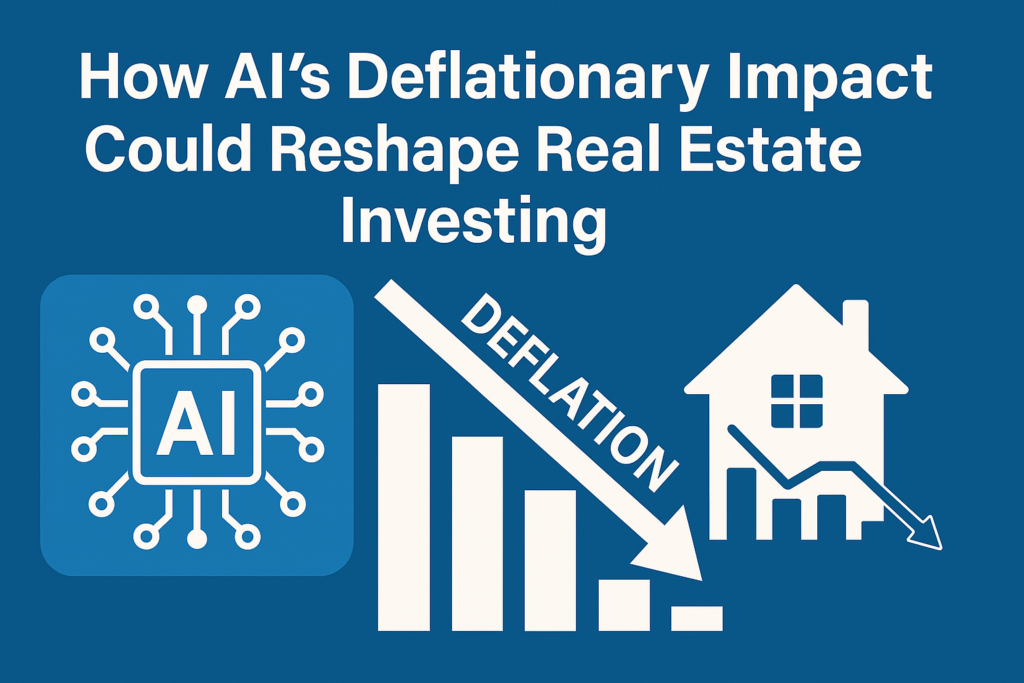Every few decades, a disruptive technology reshapes the economy—and the forward-thinkers who understand it early win big. Right now, that technology is artificial intelligence. But here’s the twist most investors aren’t talking about:

AI is deflationary—and that has major implications for real estate investors.
Let’s break it down, plain and simple.
What Does “Deflationary” Mean?
Deflation doesn’t mean “bad economy.” It means falling prices—usually because productivity is going up. When a new technology like AI dramatically increases efficiency, the cost to produce goods and services drops. That savings often gets passed along to consumers, which drives prices down.
History backs this up:
- TVs used to cost $1,200. Now a 55” flat screen is $350.
- Laptops were once $1,500 for entry-level. Today, you can get a solid one for $450.
- AI tools that cost $20/month today would’ve required a $100,000 data scientist just a few years ago.
Now imagine that same level of cost-cutting productivity applied across every sector of the economy.
The Big Picture: AI + Productivity = Deflation
As AI becomes smarter, faster, and more accessible, it’s streamlining everything from customer service to construction, lending, property management, and logistics. We’re watching entire workflows shrink from days to minutes.
In economic terms, that’s deflationary pressure.
Why Real Estate Investors Should Care
Now let’s bring it home. What does this mean for real estate investors?
1. Construction & Development Costs May Drop
AI-powered robots, 3D printing, and supply chain optimization could reduce material waste and labor inefficiencies. That means cheaper builds and faster timelines—potentially increasing margins for developers and reducing capex for value-add investors.
2. AI-Driven Operating Efficiencies
Property managers using AI tools for tenant screening, rent collection, maintenance requests, and energy optimization can slash operating costs—which boosts net operating income (NOI) and property value.
3. More Accessible Financing
AI is shaking up the lending world, making underwriting faster and more data-driven. With deflation, the Fed may eventually ease interest rates. Together, this could mean easier, cheaper access to capital.
4. Rents May Flatten (or Fall)
While investors love cash flow, deflation means renters may not tolerate aggressive rent hikes. If wages stagnate while productivity rises, affordability pressures may cap rent growth—especially in tech-heavy urban markets.
5. Asset Prices Could Rebalance
If AI reduces operational costs but also pressures rent and wages, property valuations may shift. Investors who understand this early can reposition portfolios accordingly—focusing on cash flow efficiency over speculative appreciation.
So, Is AI Good or Bad for Real Estate Investors?
It’s not about “good” or “bad.” It’s about being ahead of the curve.
Investors who understand how deflation reshapes the economic landscape will: ✅ Find new acquisition strategies
✅ Prioritize operationally lean properties
✅ Embrace AI to cut costs and increase NOI
✅ Rebalance portfolios toward future-proof assets
In other words: AI is a deflationary force you can’t afford to ignore.
Final Thought: This Is the Worst AI Will Ever Be
Think AI is impressive now? Just remember:
This is the worst AI will ever be.
It’s only getting smarter, faster, and more embedded into everything—including real estate. If you want to thrive as a real estate investor in the AI era, start thinking like a tech investor, not just a property flipper.
The future is already happening. Are you adjusting your strategy? Are you paying attention?

